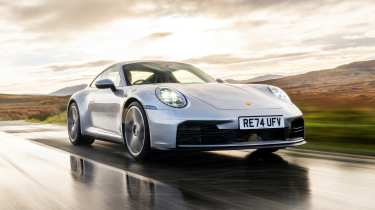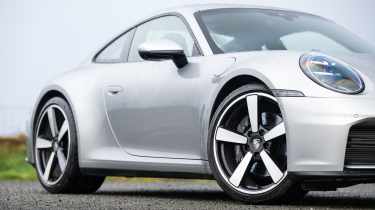Porsche 911 review 2025 – Gen2 992 is the 911 for the digital age
The 992-generation 911 has taken time to reveal its character, but it’s evolved into a sports car with enormous breadth and ability
When the 992-generation Porsche 911 first arrived, we had our reservations about whether it was an evolutionary step too far for the iconic sports car. Yes, it was more capable than the 991 it replaced, but also bigger, heavier and less readily exploitable, with that typical 911 magic only showing itself when you worked the car hard.
With time, however, we’ve grown more fond of the 992 – particularly as the range has been fleshed out with more involving versions like the Carrera T, Carrera GTS and of course the GT3, GT3 RS and S/T. The weird, wonderful and ultra-limited Dakar and Sport Classic are other highlights.
In 2025, the 992.2 model boasts a series of updates to keep this momentum going – some small, and some hugely significant. The latest GTS, for example, is the first hybrid-powered 911, bringing a new dimension of performance, personality and efficiency to the package. For now, it lines up alongside the Carrera, Carrera S, manual-only Carrera T and the newly updated GT3. With time, 992.2 GT3 RS and Turbo models will arrive, too.
So if you’re after a 2+2 sports car there’s almost certainly a 992 to suit. But is the 911 still at the top of its game after its latest evolutionary step?
Porsche 911 in detail
- Engine, gearbox and technical highlights > Engine range comprises a pair of turbocharged 3-litre flat-sixes, alongside a 3.6-litre hybrid unit and the GT3’s 4-litre naturally-aspirated motor
- Performance and 0-60mph time > The 992 is a properly quick car, with even the base Carrera taking just 4.1secs to reach 62mph
- Ride and handling > Still feels like a proper 911, but only delivers those familiar sensations when you’re driving hard
- Interior and tech > The 992’s cabin is more versatile than ever, but many of the analogue elements have been swapped for digital ones
- MPG and running costs > Expect economy in the high 20s or low 30s at a cruise – and big bills for tyres and brakes
- Design > Can look bulky from some angles, but overall the 911 perfectly pairs the model’s classic proportions with some slick surfacing and modern details
Price and rivals
The 992 represented a fairly serious jump in pricing compared to previous generations, but inflation and strong demand has encouraged those prices to keep rising since its 2019 debut. As a result, the 992.2 now starts from £99,800 in base Carrera form – serious money for a sports car.
More reviews
Group tests
In-depth reviews
Long term tests
Reviews
For the more driver-focussed Carrera T, you’ll pay £111,300, and just shy of £120k for a Carrera S. All these models feature a turbocharged 3-litre flat-six, with the Carrera S and T rated at 389bhp and the S producing 473bhp. The Carrera T is the only one of the three offered with a six-speed manual gearbox in place of Porsche’s PDK unit.
Topping the Carrera range is the £132,600 GTS, which is again PDK only and available with either rear or four-wheel drive. It comes with a 3.6-litre turbocharged flat-six, with a hybrid system boosting power to 534bhp. All of the aforementioned models are available as Cabriolets, with only the 4 GTS offered as a Targa.
Then come the GT products, with the GT3 costing £157,300 in both winged and Touring forms. We’re still waiting for a 992.2 GT3 RS, however, which is expected to top the range at around £200k. A hybrid 992.2 Turbo is waiting in the wings, too.
With such a spread of models, specific rivals are difficult to pin down. At the lowest level, cars like the Lotus Emira, BMW M4 or even Alfa Romeo’s Giulia Quadrifoglio could be considered Carrera rivals, while everything from the Mercedes-AMG GT to the Aston Martin Vantage or McLaren Artura could be compared to a heavily-specced GTS. The GT3, meanwhile, has few track focussed competitors in the £150k price bracket. The AMG GT63 Pro is one potential alternative, and if you’re buying used, you can bag a 991.2 GT3 RS for similar money.





